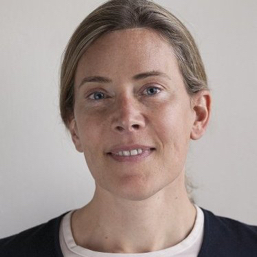
Bérénice Mettler, Ph.D.
Founder & CEO
Bérénice Mettler has a lifelong fascination with human movement skills and their reproduction with technology, particularly the contrasts between how movement is controlled and learned in humans and machines. This duality has influenced her career path starting with work on flight control and guidance of agile unmanned vehicles, analyzing human pilot skills, and more recently, understanding and modeling human movement skills to build technologies that augment learning and performance.
Born in Geneva, Switzerland, Bérénice earned a degree in mechanical engineering from the Swiss Federal Institute of Technology (ETH), followed by a PhD from Carnegie Mellon University and postdoctoral work at Massachusetts Institute of Technology (MIT).
From 2006 to 2016, Bérénice was an assistant and then associate professor at the University of Minnesota (UMN), where she founded and led the Interactive Guidance and Control Lab (IGCL). While on sabbatical in 2015, she founded iCueMotion with the mission of building technology to augment human movement learning, transforming how humans train and rehabilitate movement.
Her philosophy is to build tools that leverage movement measurements and feedback and work in harmony with natural human sensory-motor and learning processes to create long-term physical and mental benefits for users and society. Her work with the iCueMotion team leverages her academic experience in modeling, guidance and control, robotics, human factors, and cognitive neurosciences.
Bérénice's research has been recognized with several best paper awards. She has authored close to 100 peer-reviewed papers, including several highly cited publications in the field of unmanned aerial vehicles. She is the recipient of a 2012 NSF Career Award, and in January 2017, she was honored by President Obama and the White House Office of Science and Technology with the Presidential Award for Early Career in Science and Engineering (PECASE).
Research Career Details
While earning her PhD at Carnegie Mellon University, Bérénice performed the first rigorous investigation of small-scale helicopter flight dynamics using system identification tools with the goal of enhancing flight control performance for agile maneuvering. She received a University Award for her contributions to Carnegie Mellon's victory at the 1997 International Aerial Robotics Competition.
As a postdoc and then researcher at MIT from 2001 to 2005, she conducted her own independent research through a NASA grant, which led to contributions on spatial guidance for autonomous flight. These contributions included real-time trajectory planning using spatial value function which encodes behavior as a spatial time-to-go function and enables real-time trajectory optimization in complex environments. Simultaneously, while building on her PhD thesis on helicopter system identification, modeling, and flight control, Bérénice assisted with mentoring Professor Eric Feron's PhD and Masters candidates. This project culminated in the first fully automatic unmanned acrobatic flight.
In 2006, she joined the department of Aerospace Engineering and Mechanics at UMN. Her goal, in the context of founding the Interactive Guidance and Control Lab (IGCL), was to investigate artificial and human spatial guidance and control skills. During her tenure at UMN, she supervised seven PhD students and obtained support for her research from the National Science Foundation (NSF), Army Flight Dynamics Directorate (AFDD), Office of Naval Research (ONR), National Aeronautics and Space Administration (NASA), and the Jet Propulsion Lab.
Bérénice's work at her UMN lab (IGCL) provided her with the opportunity to deepen her understanding of the principles exploited by the human brain to achieve agile performance in complex environments. By applying the concept of spatial value function, she created a mathematical framework for investigating principles that underlie the structure and organization of spatial behavior that can be leveraged for more efficient learning and computing.
Working closely with her students, she applied this framework to both autonomous and human guidance skills in complex spatial environments. Some of the key results include the formalization of the concept of subgoals, their role in abstraction and learning, and how this behavioral structure helps elucidate a system-wide control architecture.
At iCueMotion Bérénice continues to research spatial movement skills, with an emphasis on so-called open motor skills such as tennis or skiing, which involve dynamic interactions with the task or activity environment. She and her team have built a data-driven framework for modeling, assessing, and training movement skills across different domains. This framework combines individual users' data with population-wide data, enabling systemic modeling of the skill acquisition process including the influence of individual factors. Ultimately, these insights can be leveraged for data-driven training.
Bérénice's Google Scholar Profile
The Team

Bin Li
Senior Data Scientist
Bin received his PhD in Aerospace Engineering and Mechanics from University of Minnesota and his MS and BS from Harbin Institute of Technology in China. His research focuses are system dynamics and control, machine learning, human and human-assisted control, and human skill assessment. His hobbies include badminton, basketball, and traveling.

Hyunjoo Oh
Data Scientist
Hyunjoo obtained two Master's degrees in Aerospace Engineering at the Seoul National University and in Robotics at the University of Pennsylvania. Her research focuses are system dynamics and control, artificial intelligence, and robotics. Over the 7 years, she had worked for General Motors as a group leader and Samsung as a senior researcher. As a HILS (Hardware in the Loop Simulation systems) group leader, she developed engine control algorithms and automated testing procedures and won the GM president award. At SAMSUNG, she developed path planning algorithms and a simulator for autonomous surveillance vehicles. Her goal at iCueMotion is to develop novel technologies that can improve human life.

Vivek Venkatram
Lead Computer Vision/Machine Learning Engineer
Hailing from Mumbai, India, Vivek spent most of his reality nurturing an increasing curiosity towards all things virtual. He obtained a Master’s degree in Robotics from the GRASP Laboratory at the University of Pennsylvania. His interests range from tinkering with nuts and bolts to applying Machine Learning and Deep Learning to solve problems in Computer Vision (human pose estimation, 3D reconstruction of deformable and articulated objects, visual servoing, SLAM and visual art). When he is not building (or breaking!) robots, Vivek loves to headbang to metal music, cook Indian food, and explore the nearest biking and hiking trails on quick weekend getaways.

David P. Rodriguez
Full-stack Developer
David obtained a bachelor’s degree in Computer Science and Technology from the Technical University of Monterrey in Mexico. He is a software developer with experience building distributed systems from the ground up, including cloud, database, and web-based applications to improve operational internal business processes. He is especially passionate about working on projects that have positive impact, including a web-based system to manage “Premio Mujer Tec,” an award that recognizes outstanding women in his college community. In addition to coding, David enjoys being outdoors and discovering new music.

Pat Murphy
Senior iOS Developer
Pat obtained a BSEE from University of Washington specializing in Computers. He has over 20+ years of full time software development experience. He is an expert in Swift, SwiftUI, and Objective-C along with Xcode and iOS Apps having done over thirty Apps in the App Store. He has done numerous Apps in the Medical field that have had data security and encryption. He enjoys working on his house and garden and has two dogs that he enjoys immensely. He has also enjoys writing Science Fiction stories and hopes to get published some day.